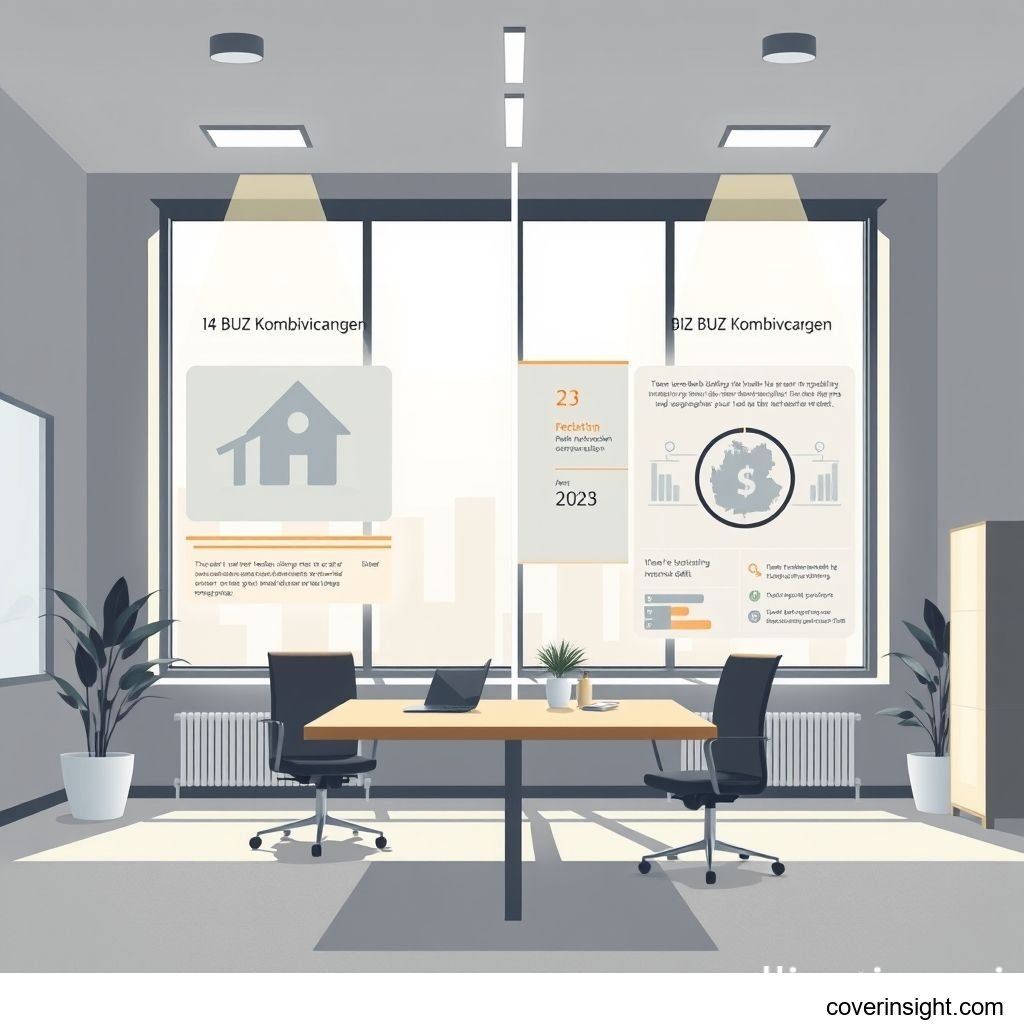Introduction
As Germany progresses into 2025, the country faces a complex economic landscape significantly shaped by its national debt. Understanding the implications of this financial burden is crucial for every citizen and business. The level of national debt can profoundly influence interest rates, inflation, and the overall economic stability, directly impacting personal financial planning and investment strategies. It is within this challenging environment that comprehensive financial safeguarding, such as that offered by a BUZ Kombiversicherung, gains paramount importance. The management of this national debt is not merely a statistical exercise; it affects everything from public services to the purchasing power of the euro, urging individuals to seek robust personal financial solutions.
The German Economic Landscape and National Debt
Germany's economic health in 2025 continues to navigate the aftermath of global crises, with national debt remaining a central concern for policymakers and citizens alike. The cumulative borrowing by the federal government, states, and municipalities directly affects fiscal policy and future economic growth. Understanding the trajectory of this national debt is essential for anticipating economic shifts and making informed decisions about personal financial security.
Historical Context of National Debt in Germany
Germany's national debt has experienced significant fluctuations, particularly following reunification, the 2008 financial crisis, and the recent pandemic. Each event necessitated substantial public spending, leading to increased borrowing. The Stability and Growth Pact, along with Germany's "debt brake" (Schuldenbremse), aims to contain future increases, yet the current national debt level remains substantial. Historical trends show how external shocks and domestic policy decisions have cumulatively shaped the current financial obligations.
Economic Implications of Elevated National Debt
A high national debt carries several economic ramifications. It can lead to higher interest payments, potentially crowding out public spending on education, infrastructure, or social services. Moreover, persistent deficits contributing to national debt might fuel inflationary pressures, eroding the value of savings.
Potential consequences include:
-
Increased Tax Burden: Future generations may face higher taxes to service the national debt.
-
Reduced Public Investment: Funds diverted to debt servicing limit investments in critical sectors.
-
Inflationary Pressures: Excessive money supply to finance debt can lead to rising prices.
-
Impact on Interest Rates: Government borrowing can compete with private sector borrowing, potentially driving up interest rates.
-
Currency Devaluation: Persistent high national debt can weaken investor confidence, affecting currency stability.
These factors make strategic financial planning, including considering products like a BUZ Kombiversicherung, even more vital for individuals looking to protect their assets.
BUZ Kombiversicherung: Tailored Security in Uncertain Times
In an economic climate influenced by the scale of national debt, safeguarding personal finances is a top priority. A BUZ Kombiversicherung, or combined insurance, offers a multi-faceted approach to risk management. It merges various insurance coverages into a single policy, often providing cost efficiencies and simplified administration. This type of insurance can be particularly appealing for those seeking comprehensive protection against diverse risks without managing multiple separate policies.
What’s Included in a BUZ Kombiversicherung
A typical BUZ Kombiversicherung integrates several essential protections. This comprehensive coverage helps individuals mitigate risks that could otherwise lead to significant financial strain, especially when the economic environment is uncertain due to national debt. Common components include:
-
Private Liability Insurance (Haftpflichtversicherung): Covers damages you unintentionally cause to others.
-
Household Contents Insurance (Hausratversicherung): Protects your belongings against fire, theft, water damage, and natural hazards.
-
Legal Expense Insurance (Rechtsschutzversicherung): Assists with legal costs in various disputes.
-
Accident Insurance (Unfallversicherung): Provides financial compensation in case of permanent disability due to an accident.
This integrated approach helps individuals protect their assets and income, providing a buffer against unforeseen events in an economy influenced by the national debt. For more general information on German insurance products, you can visit GDV - German Insurance Association.
Common Exclusions in a BUZ Kombiversicherung
While comprehensive, a BUZ Kombiversicherung also has specific exclusions. It's crucial for policyholders to be aware of these limitations to avoid misunderstandings, particularly when economic stability might be impacted by the national debt. Typical exclusions often include:
- Damages caused intentionally.
- Losses from war, civil unrest, or nuclear energy.
- Damage to vehicles (covered by separate motor insurance).
- Professional liabilities (requiring specific professional indemnity insurance).
- Damages from gross negligence, though some policies offer extensions for this.
- Pre-existing conditions not disclosed at the time of policy inception.
Understanding these exclusions is paramount to ensuring adequate and appropriate coverage.
Cost Analysis and Value Proposition
The cost of a BUZ Kombiversicherung is a key consideration for many, particularly when household budgets are strained by broader economic factors like national debt. However, the value derived from comprehensive protection often outweighs the premium. Evaluating the price factors and exploring saving tips can help optimize this financial decision.
Price Factors for BUZ Kombiversicherung
Several elements influence the premium for a BUZ Kombiversicherung. These factors dictate the final cost and reflect the level of risk perceived by the insurer. Key determinants include:
-
Scope of Coverage: More extensive coverage naturally leads to higher premiums.
-
Sum Insured: The higher the value of household contents or liability limits, the greater the cost.
-
Deductibles (Selbstbehalt): Choosing a higher deductible often lowers the premium.
-
Location: Certain areas may have higher risks (e.g., crime rates, natural disaster susceptibility).
-
Personal Risk Profile: Individual circumstances, such as occupation or past claims history, can play a role.
-
Payment Frequency: Annual payments are often cheaper than monthly or quarterly.
Comparing offers based on these factors is essential for finding a suitable and affordable BUZ Kombiversicherung.
Saving Tips for Your BUZ Kombiversicherung
Optimizing your BUZ Kombiversicherung costs without compromising essential coverage is achievable. Smart strategies can help you save, particularly when managing personal finances in the shadow of national debt. Consider these tips:
-
Bundle Policies: Combining multiple insurances with one provider often qualifies for discounts.
-
Increase Deductibles: If you can afford to cover a larger initial portion of a claim, your premiums will decrease.
-
Annual Payments: Paying your premium annually instead of monthly can reduce administrative surcharges.
-
Review Coverage Regularly: Ensure your coverage still matches your current needs; avoid paying for unnecessary protections.
-
Compare Providers: Regularly shop around and compare offers from different insurers.
-
Utilize Discounts: Look for discounts for non-smokers, specific professions, or multi-year contracts.
These measures can make a significant difference to the overall cost of your BUZ Kombiversicherung.
Steuerliche Behandlung LV: Optimizing Your Investment
Beyond traditional combined insurance, understanding the Steuerliche Behandlung LV (tax treatment of life insurance) is crucial for comprehensive financial planning, especially when considering the long-term economic implications of national debt. Life insurance policies, including unit-linked or classic endowment policies, can offer both financial protection and potential investment growth.
Tax Implications of Life Insurance Payouts
The Steuerliche Behandlung LV for payouts depends largely on the type of policy and its duration. In Germany, a distinction is made between payouts during the term (e.g., from an investment component) and maturity benefits.
Key aspects include:
-
Pillar 1 (Basisversorgung): Certain Riester or Rürup policies are tax-deductible during the contribution phase, but fully taxable upon payout in retirement.
-
Pillar 2 (Betriebliche Altersvorsorge): Employer-sponsored schemes often benefit from tax advantages during contribution, with deferred taxation upon payout.
-
Pillar 3 (Private Vorsorge): Traditional life insurance policies or private annuity contracts have specific rules. If a policy has run for at least 12 years and the insured person is over 60 (or 62 for policies concluded after 2012), only 50% of the capital gains are subject to income tax.
Understanding these nuances is essential for maximizing the benefits of your life insurance investments, particularly when navigating the economic landscape shaped by national debt. For regulatory oversight regarding financial products, you can consult BaFin - Federal Financial Supervisory Authority.
Strategies for Tax-Efficient LV Investments
Optimizing the Steuerliche Behandlung LV requires careful planning and understanding of current tax laws. Given the potential long-term impacts of national debt on fiscal policy, strategic decisions are vital.
Consider these strategies:
-
Long-Term Horizon: Aim for policies with a term of at least 12 years to benefit from the 50% tax exemption on capital gains at maturity.
-
Age at Payout: Plan payouts after reaching the age of 60 or 62 to qualify for preferential tax treatment.
-
Utilize Tax Deductions: Explore possibilities for deducting contributions as special expenses (Sonderausgaben), though these are often limited.
-
Policy Type Selection: Differentiate between pure risk policies (e.g., term life insurance), where premiums are generally not deductible but benefits are tax-exempt, and capital-forming policies.
-
Professional Advice: Consult a tax advisor to understand the specific implications for your individual situation.
Properly structured life insurance can be a valuable tool for long-term wealth accumulation and security, especially when factoring in the broader economic environment and the current national debt. For additional insurance resources, check Insurance Resources Global.
Personal Financial Planning Amidst National Debt
The pervasive presence of national debt in public discourse and its tangible effects on the economy necessitate a proactive approach to personal financial planning. Secure financial solutions, including a well-chosen BUZ Kombiversicherung and strategic life insurance, offer peace of mind. Individuals must consider how government fiscal policies, influenced by national debt, might affect their savings, investments, and future purchasing power.
Proactive Steps for Financial Security
In an era defined by fluctuating economic indicators and substantial national debt, taking proactive steps ensures greater financial resilience. Key actions include:
-
Emergency Fund Creation: Build a robust emergency fund to cover at least 3-6 months of living expenses.
-
Diversified Investments: Spread investments across different asset classes to mitigate risk.
-
Debt Reduction: Prioritize paying down high-interest personal debt to free up cash flow.
-
Regular Financial Review: Periodically assess your budget, investments, and insurance needs.
-
Long-Term Planning: Plan for retirement, education, and other major life goals, considering the long-term economic outlook.
These steps, combined with appropriate insurance coverage like a BUZ Kombiversicherung, form a strong foundation for financial stability. For more specific German financial guidance, consult DE Insurance Home.
Adapting to Economic Shifts
The German economy is dynamic, and adapting personal financial strategies to ongoing changes, including those driven by national debt, is crucial. This adaptability ensures that financial goals remain realistic and achievable. Strategies for adaptation include:
-
Stay Informed: Keep abreast of economic news, especially regarding interest rates, inflation, and government fiscal policy.
-
Re-evaluate Risk Tolerance: Adjust your investment strategy based on changing market conditions and your personal risk appetite.
-
Consider Inflation-Proofing: Explore assets that traditionally perform well during periods of inflation, which can be a concern with high national debt.
-
Flexible Budgeting: Create a budget that can be adjusted in response to changes in income or expenses.
-
Continuous Learning: Educate yourself on various financial products and strategies, including the Steuerliche Behandlung LV and the nuances of a BUZ Kombiversicherung.
FAQs
How much does national debt cost?
The direct cost of national debt is primarily the interest payments the government must make to its creditors. This sum fluctuates based on the total debt outstanding and prevailing interest rates. In 2025, these costs represent a significant portion of the federal budget, money that could otherwise be spent on public services or tax relief.
What affects premiums for a BUZ Kombiversicherung?
Premiums for a BUZ Kombiversicherung are influenced by several factors: the specific types of coverage included, the sums insured for each component, your chosen deductibles, your geographical location, and your individual risk profile. More comprehensive coverage or higher sums insured generally lead to higher premiums.
Is a BUZ Kombiversicherung mandatory?
No, a BUZ Kombiversicherung is not mandatory in Germany. However, some of its individual components, such as private liability insurance, are often considered essential and highly recommended due to the potential financial consequences of not having them.
How to choose the right BUZ Kombiversicherung?
Choosing the right BUZ Kombiversicherung involves assessing your personal needs, comparing different providers' offers based on price and scope of coverage, checking for exclusions, and considering customer reviews. It's advisable to seek independent advice to ensure the policy aligns with your specific situation and budget.
What are the consequences of no coverage from a BUZ Kombiversicherung?
Without coverage from a BUZ Kombiversicherung, you would be personally liable for any damages or losses that would otherwise be covered. This could lead to significant financial burdens, especially in cases of severe personal injury, property damage, or legal disputes, which could have a severe impact on your financial stability in any economic climate, including one influenced by high national debt.









Comments